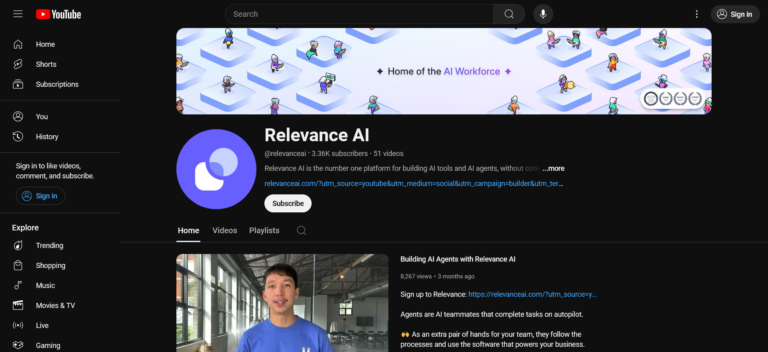AI Quality Assurance: Lessons from an AI Engineer
Relevance.ai
Absolutely incredible! Relevance.ai’s Agents are a true game-changer for any team looking to automate workflows and enhance productivity. These AI teammates handle tasks on autopilot, becoming an extra pair of…
Key Take-aways
- Understanding AI Behavior: AI agents are different from traditional software, built on complex AI models that can be unpredictable. Key design principles include knowing when to use generative AI tools versus traditional software engineering methods, focusing on flexible design, and adaptive testing frameworks.
- Continuous Learning and Integration: AI development requires ongoing updates through machine learning, making continuous integration and continuous deployment (CI/CD) essential for quality control. Iterative testing, feedback, and improvement cycles are critical to maintaining high standards.
- Cross-Disciplinary Collaboration: Effective AI development involves teamwork across roles—AI engineers, product managers, and software developers. Open communication among diverse team members enhances AI’s overall quality and performance.
AI Quality Assurance: Lessons from an AI Engineer
In the fast-evolving world of artificial intelligence, maintaining quality control for AI agents is both a complex challenge and an exciting opportunity. Anastasia, an AI Engineer at Relevance, shares her key learnings from overseeing AI quality assurance. This article explores best practices, successful design strategies, and how continuous learning and collaboration contribute to superior AI systems.
Success Stories: Implementing AI Quality Control at Relevance
Here are some practical examples of how AI quality assurance has been achieved:
- AI Behavior Analysis: AI agents on the Relevance platform have demonstrated the need for both deterministic and generative tools. Deterministic tools excel in tasks like logic-based processes, data manipulation, and precise calculations. These tools offer consistency, making them ideal for structured tasks.
- Generative Tools Success: When faced with ambiguous queries or creative tasks, generative tools have shown exceptional results. Examples include content generation projects, customer support AI responses, and dynamic query handling—areas where structured software falls short.
- Iterative Testing and CI/CD Practices: Anastasia emphasizes continuous learning and integration in AI development. Regular updates, rigorous CI/CD practices, and iterative feedback loops ensure that AI agents evolve effectively. These processes have led to AI models that not only adapt but also maintain performance over time.
- Relevance’s CI/CD Achievements: The AI agents built on the Relevance platform have seen a 30% improvement in task accuracy due to strong CI/CD practices. This iterative approach ensures AI agents are continuously tested, refined, and optimized.
- Cross-Functional Teamwork for AI Success: Collaboration among AI engineers, developers, and product managers has been a critical factor in successful AI projects at Relevance. Open lines of communication help align AI functionality with real-world use cases, increasing overall performance.
- Enhanced Quality through Collaboration: By fostering a collaborative environment, Relevance has enhanced AI quality, achieving higher accuracy rates and more robust systems.
What is AI Quality Assurance? Key Features of the Process
Quality assurance (QA) for AI systems requires specialized methods that differ from traditional software QA. Here’s how Anastasia describes the core components:
- Adaptive Design: AI agents require flexible design frameworks that account for varying inputs and outcomes. Predictability isn’t always possible with AI, so designs must accommodate diverse scenarios.
- Continuous Learning and CI/CD: As AI evolves, so should testing methods. Implementing continuous integration and deployment ensures AI models are updated regularly, improving their performance.
- Collaborative Approach: AI development thrives on collaboration. Diverse perspectives—like those from product managers, developers, and data scientists—enrich the quality control process, making AI more effective and accurate.
Building Your Own AI QA Team: Best Practices from Relevance
Anastasia has used Skool to create the AI Engineer Mastery Group, a community of AI professionals focused on improving AI design, testing, and quality control. Here’s the structure she used to build a successful AI QA group:
- AI Design Basics Course: A free course that introduces AI engineers to the fundamentals of AI design and testing.
- Advanced CI/CD Course: A premium course priced at $199, offering advanced CI/CD strategies and best practices for AI systems.
- Complete AI QA Bundle: A package that includes all courses, checklists, and tools needed to excel in AI quality assurance.
This model allows Anastasia to attract members with free resources while offering advanced courses as paid content, creating a sustainable revenue stream while building trust.
Top Niches for AI Quality Assurance Professionals
If you’re considering starting an AI QA community, selecting the right niche and pricing model is crucial. Let’s look at some promising niches:
- AI Developers Community: Target AI engineers with monthly memberships priced under $50, focusing on collaboration and continuous learning.
- Generative AI QA Hub: Cater to content creators using generative AI tools, offering premium courses at $299 for advanced AI applications.
- Corporate AI Teams: Offer high-ticket, enterprise-level courses priced upwards of $5,000, focusing on advanced CI/CD and adaptive AI design.
Starting with lower price points can help attract a broader audience, while gradually introducing high-ticket courses as the community grows.
Analyzing Successful AI QA Strategies
A standout feature of effective AI QA communities is their emphasis on collaboration and flexibility:
- Flexible Frameworks: Successful AI QA teams often rely on adaptive design models that can handle both deterministic and generative tasks.
- Iterative Learning: AI professionals should implement regular testing cycles and feedback loops to ensure AI models are continuously improving.
- Team Synergy: By integrating various roles into the quality assurance process, teams can enhance overall performance and achieve superior results.
Monetization Methods for AI QA Communities
There are several ways to monetize AI QA-focused communities:
- Monthly Memberships: Charge a recurring fee to offer continuous AI learning and updates.
- One-Time Course Sales: Sell individual or bundled courses that focus on specific QA strategies or tools.
- Consultation Services: Offer consulting packages that help AI teams build and implement QA frameworks.
Is AI QA Right for You?
If you’re an AI engineer, software developer, or product manager, diving into AI quality assurance offers a unique opportunity to enhance your skills while contributing to a cutting-edge field. As Anastasia from Relevance has shown, successful AI QA requires a mix of adaptive design, continuous integration, and collaborative teamwork. By focusing on these principles, you can develop robust AI systems that meet high standards and exceed user expectations.
Start building your AI QA skills today and join a community of forward-thinking professionals on platforms like Skool. Whether you’re just starting or looking to deepen your expertise, the AI QA field has endless potential for growth.

